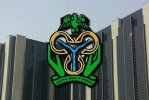
Credit to the economy rose by N850 billion in February with lending to government accounting for 84 percent valued at N720 billion.
This was the highlight of the Depository Corporation Survey for February released by the Central Bank of Nigeria (CBN) last week.
According to the survey, Net Domestic Credit rose by 2.37 percent or N850 billion to N36.66 trillion in February from N35.81 trillion in January.
Financial Vanguard analysis of the survey showed that credit to the government rose by N720 billion or 7.77 percent to N9.97 trillion in February from N9.25 trillion in January.
Credit to the private sector however rose marginally by N130 billion or 0.48 percent to N26.7 trillion in February from N26.57 trillion in January.
Consequently, credit to the government accounted for 84 percent of the N850 billion increase in Net Domestic Credit during the month while credit to the private sector accounted for just 16 percent.
The survey showed that Broad Money Supply (M3 money) declined by 0.45 percent month-on-month (M-o-M) decline to N33.98 trillion in February.
This resulted from a 15.20 percent decrease in Net Foreign Assets (NFA) to N5.65 trillion which and a 3.13 percent increase in Net Domestic Assets (NDA) to N28.33 trillion. On domestic asset creation, the increase in NDA was chiefly driven by a 2.37 percent m-o-m increase in Net Domestic Credit (NDC) to N36.66 trillion.
On the liabilities side, the 0.48 percent M-o-M decrease in M3 Money was driven by the 15.26 percent fall in treasury bills held by money holding sector to N4.25 trillion, which was accompanied by a 2.10 percent m-o-m increase in M2 Money to N29.73 trillion.
The increase in M2 was driven by a 2.74 percent rise in Quasi Money (near maturing short term financial instruments) to N19.30 trillion and a 0.93 percent increase in Narrow Money (M1) to N10.43 trillion (of which Demand Deposits increased by 1.98 percent to N8.64 trillion, although currency outside banks, moderated by 3.84 percent to N1.79 trillion).
Reserve Money (Base Money) rose sharply m-o-m by 14.78 percent to N9.63 trillion as Bank reserves rose significantly m-o-m by 21.22 percent to N7.45 trillion, partly offset by a 2.79 percent decrease in currency in circulation to N2.19 trillion.

